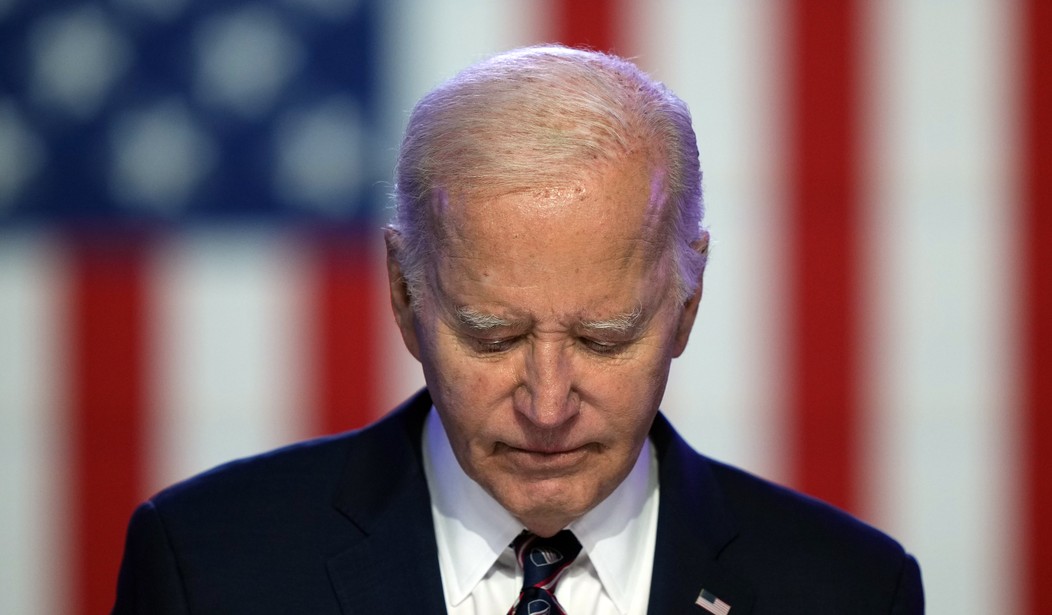This week, three American soldiers died at the hands of an Iranian proxy group that used a drone to strike an American base in Jordan. The Biden administration immediately leapt into action by issuing a strongly worded statement, while simultaneously proclaiming that they wanted to avoid escalation. Which, of course, is precisely the wrong thing to do when faced with aggression from a smaller, hostile adversary.
The right thing to do? Punch them in the mouth hard enough to deter further aggression.
That is something President Donald Trump knew innately. On Dec. 31, 2019, Iranian-backed proxy groups stormed the U.S. embassy compound in Iraq, killing a U.S. contractor. "Iran is orchestrating an attack on the U.S. Embassy in Iraq," Trump tweeted. "They will be held fully responsible." On Jan. 2, 2020, the Defense Secretary said there were "indications" that Iran was planning "additional attacks" on American targets.
On Jan. 3, 2020, the U.S. military killed Iran's top terrorist commander, Qassem Soleimani.
This led to teeth-gnashing from the American left, which declared such an activity a major escalation. Iran blustered that the assassination was "tantamount to opening a war against Iran." Trump then threatened, "Let this serve as a WARNING that if Iran strikes any Americans, or American assets, we have targeted 52 Iranian sites (representing the 52 American hostages taken by Iran many years ago), some at a very high level & important to Iran & the Iranian culture, and those targets, and Iran itself, WILL BE HIT VERY FAST AND VERY HARD."
Iran fired some missiles at some empty sites.
Recommended
That was the end of that particular exchange.
It turns out that if there is one party in the Middle East that wants a U.S.-Iran war less than the United States, it is Iran.
Which is how deterrence works.
That's what makes it so absurd that the Biden White House's first Middle Eastern goal upon taking office was to destroy deterrence against Iran. The White House first declared itself in opposition to the Saudi regime, chiding Mohammed Bin Salman over human rights violations; the White House removed the Iranian-backed Houthis from the terror list; the White House tried to reopen Iranian nuclear talks.
Despite the White House's idiocy, Sunni-Israeli peace seemed to be in the offing. In fact, as a result of the White House's idiocy, Saudi Arabia had drawn closer to Israel than ever before as a defensive measure against a resurgent Iran.
So Iran acted. Iran acted knowing that the Biden administration is cowardly in its approach to foreign affairs -- that they're willing to slow-walk aid to American allies under pressure but unwilling to countenance the credible threats of military force by which deterrence is established. And now the Biden administration continues to vacillate. After spending the months since Oct. 7 repeating ad nauseam an admonition to Iran not to escalate its violence -- "Don't!" every Biden official, including Biden himself, has repeated -- Iran has indeed escalated its violence. It turns out that saying "Don't" to aggressive foreign powers isn't nearly as effective as saying "Don't, or you may not be breathing tomorrow."
Napoleon Bonaparte once supposedly stated that his military policy was an "iron hand in a velvet glove." When the iron hand disappears, replaced with fluff, there isn't much for Iran to fear. And in an election year in which the president deeply fears a further conflict with Iran, Iran isn't the party being deterred. America is, at the cost of American lives.
























Join the conversation as a VIP Member